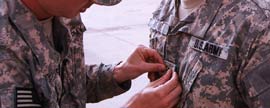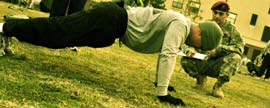AR 600-8-4 is the regulation for line of duty investigations.
Here is an extract that may assist you. I have also attached a copy of the regulation.
2–3. Requirements for line of duty investigations
Line of duty investigations are conducted essentially to arrive at a determination of whether misconduct or negligence was involved in the disease, injury, or death and, if so, to what degree. Depending on the circumstances of the case, an LD investigation may or may not be required to make this determination.
a. The LD determination is presumed to be “LD YES” without an investigation—
(1) In the case of disease, except as described in paragraphs c (1) and (8) below.
(2) In the case of injuries clearly incurred as a result of enemy action or attack by terrorists.
(3) In the case of death due to natural causes or while a passenger in a common commercial carrier or military aircraft.
b. In all other cases of death or injury, except injuries so slight as to be clearly of no lasting significance (for example, superficial lacerations or abrasions or mild heat injuries), an LD investigation must be conducted.
c. Investigations can be conducted informally by the chain of command where no misconduct or negligence is indicated, or formally where an investigating officer is appointed to conduct an investigation into suspected misconduct or negligence. A formal LD investigation must be conducted in the following circumstances:
(1) Injury, disease, death, or medical condition that occurs under strange or doubtful circumstances or is apparently due to misconduct or willful negligence.
(2) Injury or death involving the abuse of alcohol or other drugs.
(3) Self-inflicted injuries or possible suicide.
(4) Injury or death incurred while AWOL.
(5) Injury or death that occurs while an individual was en route to final acceptance in the Army.
(6) Death of a USAR or ARNG soldier while participating in authorized training or duty.
(7) Injury or death of a USAR or ARNG soldier while traveling to or from authorized training or duty.
(8) When a USAR or ARNG soldier serving on an AD tour of 30 days or less is disabled due to disease.
(9) In connection with an appeal of an unfavorable determination of abuse of alcohol or other drugs (para 4–10a).
(10) When requested or directed for other cases.
2–4. Informal LD investigations
Documentation for an informal LD investigation typically consists of DA Form 2173 completed by the MTF and the unit commander and approved by the appointing authority, State AG, or higher authority. The final determination of an informal LD investigation can result in a determination of “in LD” only, except as provided in paragraph 4–8(c)(1). (See chap 3, sect I, for a detailed discussion of the informal LD investigation.)
2–5. Formal LD investigations
A formal LD investigation is a detailed investigation that normally begins with DA Form 2173 completed by the MTF and annotated by the unit commander as requiring a formal LD investigation. The appointing authority, on receipt of the DA Form 2173, appoints an investigating officer who completes DD Form 261 and appends appropriate statements and other documentation to support the determination, which is submitted to the GCMCA for approval. (See chap 3, sect II, for a detailed treatment of the formal LD investigation.)
I would encourage you to speak with your commander on open door policy. If this course of action fails you can then consider requesting assistance through the JAG and/or IG.
Did you find this information useful? We appreciate your feedback!














